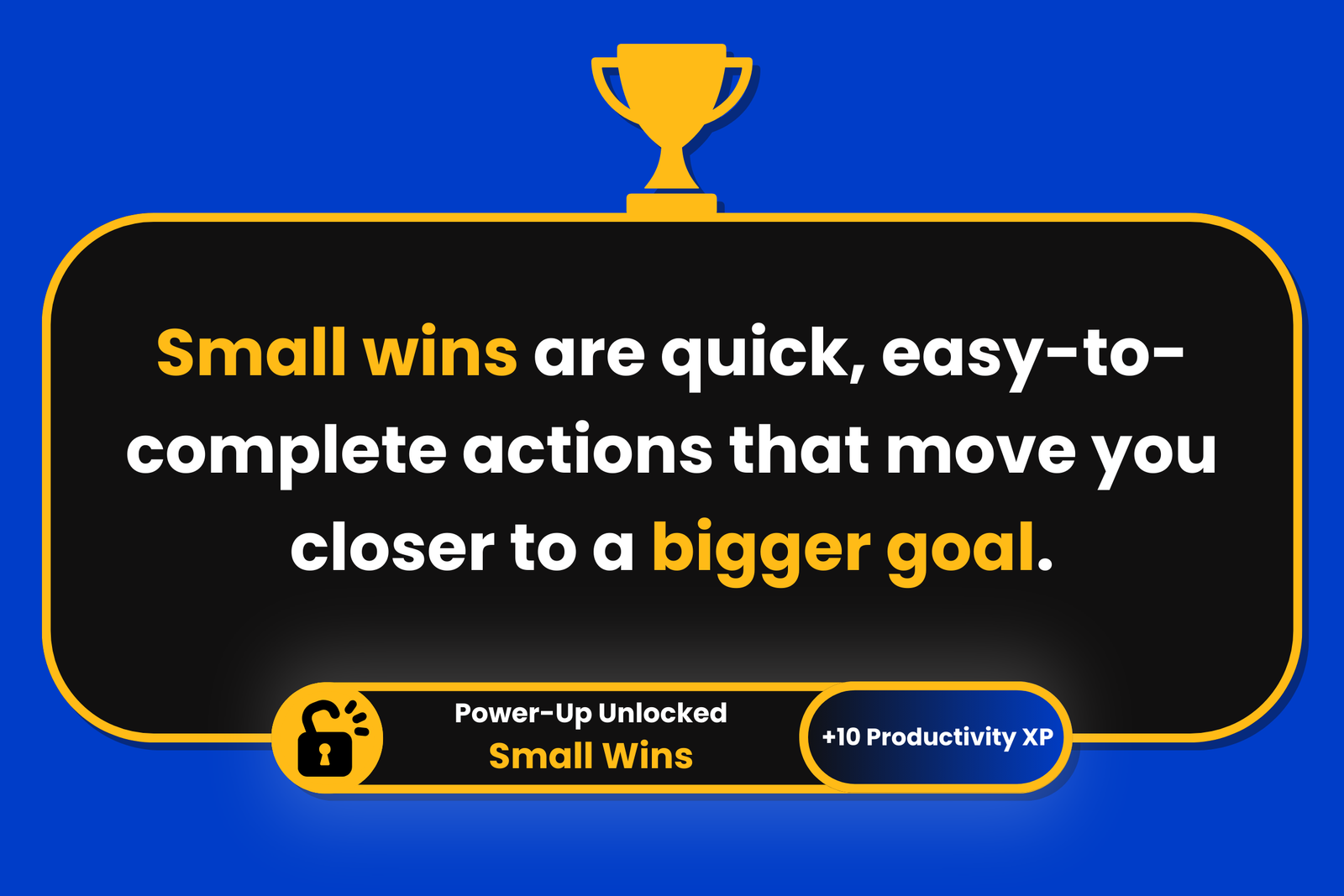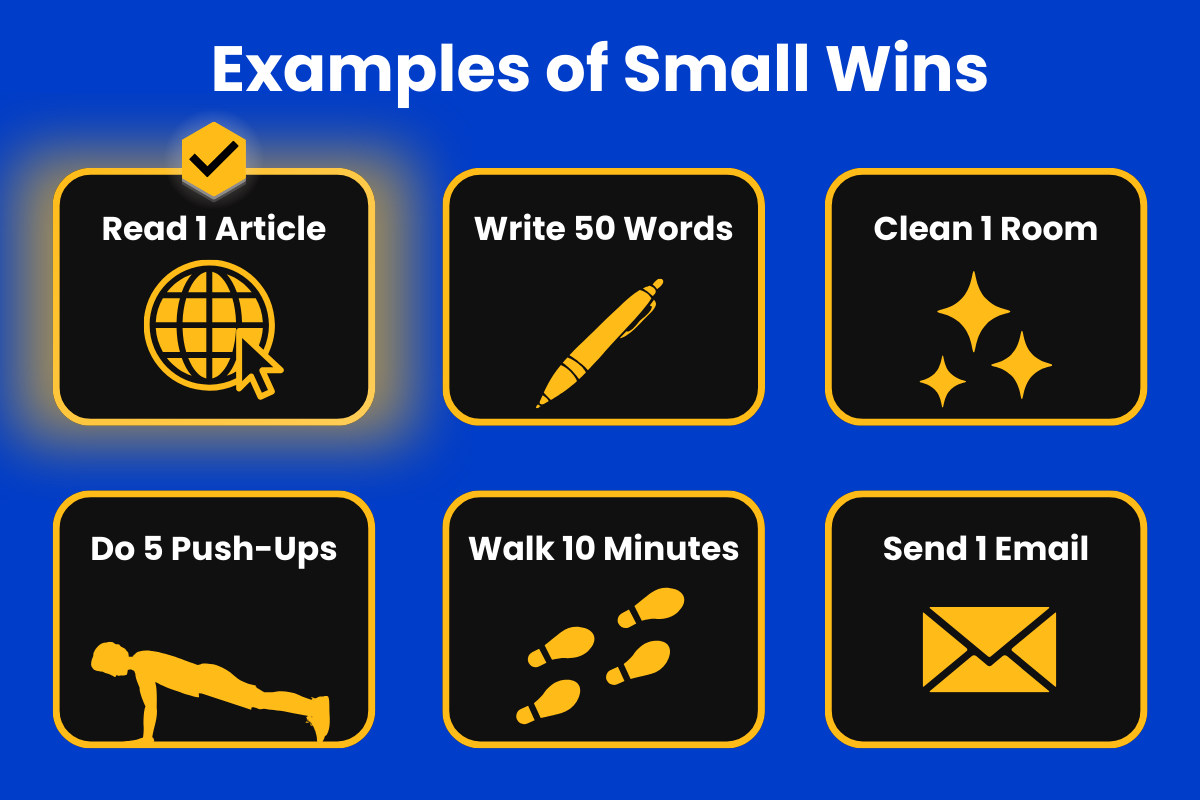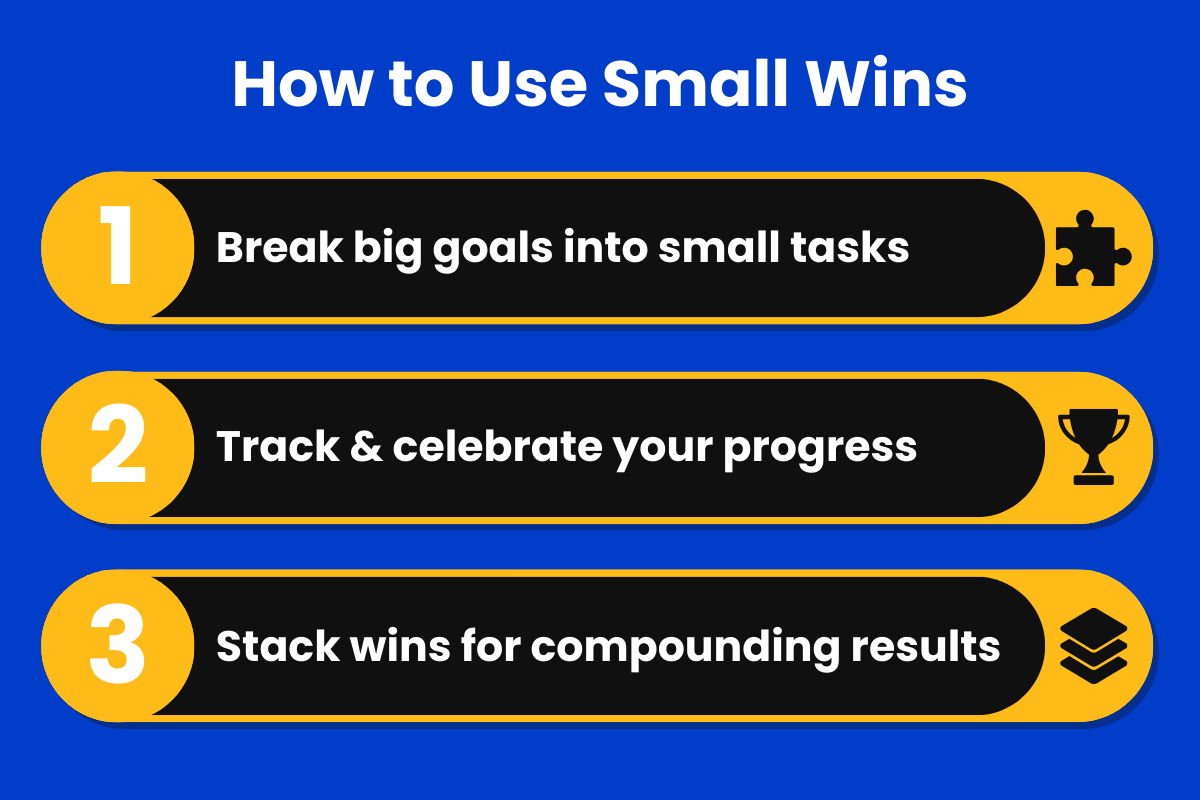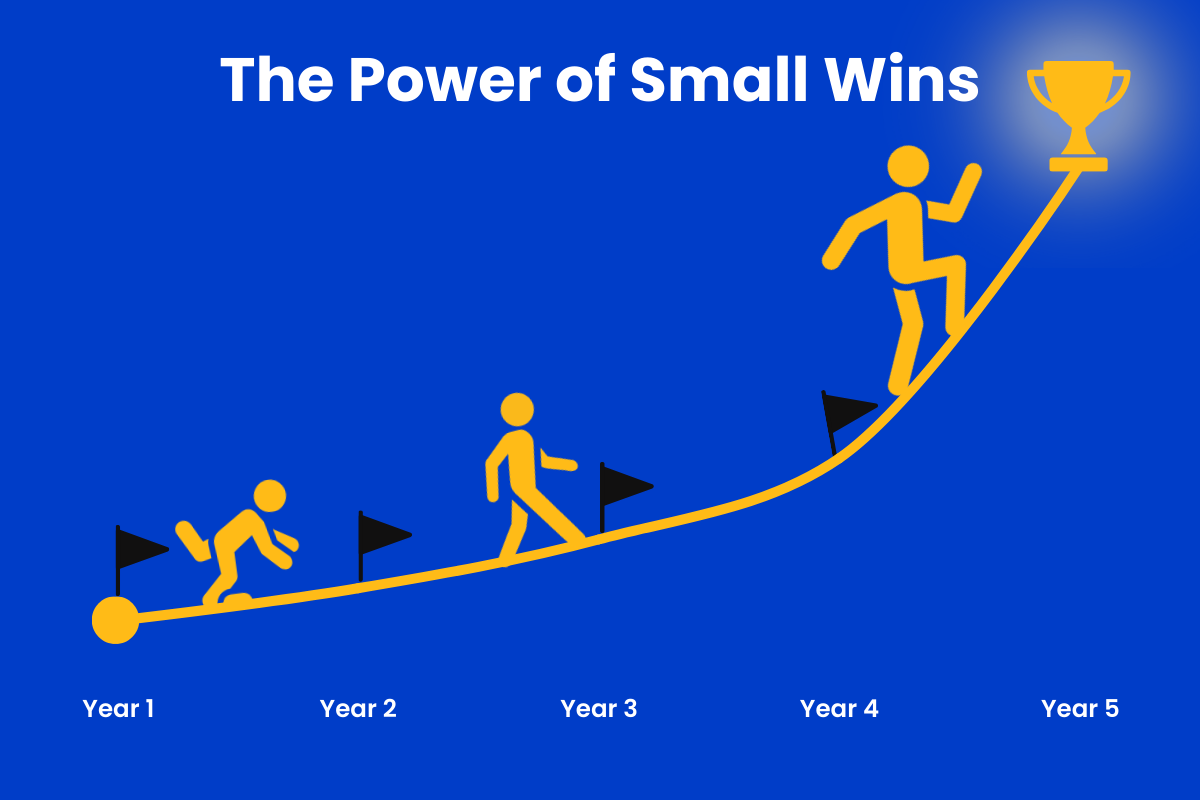What if the fastest way to massive productivity wasn’t a huge time-management overhaul… but something so small you could finish it in minutes?
That’s the power of small wins. These are the manageable, quick victories that add up to unstoppable momentum. They’re the secret weapon that turns overwhelm into action, and action into achievement.
In this post, you’ll learn exactly what small wins are, why they work, and how to use them to make steady progress toward your biggest goals. You’ll see real-world examples, practical tips, and expert-backed strategies from thinkers like James Clear (Atomic Habits) and Harvard’s Teresa Amabile (The Progress Principle).
By the end, you’ll know how to start using small wins today, and you’ll already have your first one under your belt.
Contents
What Are Small Wins and Why They Matter
Let’s start with a small wins definition: Small wins are quick, easy-to-complete actions that move you closer to a bigger goal. They’re the opposite of trying to tackle everything at once.
Think:
Sending a key email.
Writing the first 100 words of an article.
Doing 10 squats during a coffee break.
Why they matter: small wins deliver an instant motivation boost. Teresa Amabile’s research shows that making progress – even tiny progress – is one of the most powerful motivators for humans. She calls this The Progress Principle. When you feel progress, you stay engaged and energized.
Small wins also reduce overwhelm. Instead of staring at a massive, vague goal like “get fit” or “launch a business,” you focus on the next quick, doable step. That builds confidence and momentum.

The Psychology Behind Small Wins
Why do small wins work so well?
It’s all about your brain’s reward system. Completing a small task releases dopamine: the “feel good” neurotransmitter. That hit of pleasure reinforces the behavior, making you want to do it again. Over time, you create a positive reinforcement loop: action → dopamine → more action.
This is why James Clear emphasizes starting small in Atomic Habits. Small wins make habits easier to start and harder to break.
Amabile’s Progress Principle adds another layer: progress, even in tiny doses, boosts engagement, creativity, and overall satisfaction. When you can see and feel progress, you keep going.
How Small Wins Boost Motivation
When you achieve a small win, you prove to yourself that progress is possible. Suddenly, the big picture feels less daunting, similar to the 2-Minute Rule.
For example:
Checking off a small to-do list item makes the rest of the list feel doable.
A quick 10-minute clean-up makes the idea of a spotless house less overwhelming.
That spark of achievement fuels your drive to keep going.
Why Small Wins Reduce Procrastination
Procrastination thrives on intimidation. Big, vague tasks feel heavy, so you delay them. Small wins lower the barrier to action.
Instead of “write a full report,” you commit to “outline the first section.” Once you’ve started, momentum takes over. Starting was the hardest part!
▼ Ad
Examples of Small Wins in Daily Life
Small wins can happen in every area of life. Here’s how they look in different contexts.
Small Wins at Work
Sending one follow-up email you’ve been avoiding.
Organizing the top of your desk.
Finishing one section of a project draft.
Each of these creates a sense of accomplishment and sets you up for the next productive move.
Small Wins in Personal Growth
Reading one page of a book before bed.
Meditating for 2 minutes in the morning.
Writing 50 words in your journal.
These tiny steps build consistency and long-term growth.
Small Wins in Fitness & Health
Doing 5 push-ups before your shower.
Walking for 5 minutes after lunch.
Swapping soda for water at dinner.
None of these will transform your life overnight, but together they create massive health gains over time.

How to Use Small Wins for Big Productivity Gains
You can turn small wins into a daily habit. Here’s the step-by-step method.
1. Break Big Goals Into Smaller Tasks
Big goals feel impossible because they’re abstract. Make them concrete.
Example: instead of “Write a book,” start with “Write 100 words today.” That’s one small win. Do it daily, and you’ll have 36,500 words in a year.
2. Track and Celebrate Your Progress
Tracking makes progress visible, which boosts motivation.
Use:
A simple calendar with checkmarks.
- A Notion checklist template.
Every tick is proof you’re moving forward.
3. Stack Small Wins for Compounding Results
James Clear’s concept of habit stacking is perfect here: attach a new small win to an existing habit.
Example: “After I make coffee, I’ll write one sentence for my blog.” Do that daily, and the wins pile up.

Common Mistakes to Avoid
Small wins are powerful, but only if used well. Watch out for these pitfalls:
Losing sight of the big picture: Small wins should connect to your bigger goals, not distract from them.
Skipping acknowledgment: If you don’t pause to notice progress, the motivation boost disappears.
Inconsistency: Occasional small wins won’t create momentum. Make them daily.
▼ Ad
Small Wins and Long-Term Success
Small wins may feel… well, small. But over months and years, their impact compounds like interest in a savings account.
If you improve just 1% a day, you’ll be 37 times better in a year. That’s the math of momentum.
Think of each small win as adding a brick to a wall. One brick isn’t much. But if you lay one every day, you eventually have a fortress.

Start Today: Your First Small Win
Let’s create your first small win right now.
Here’s a 2-minute task: write down the next tiny step toward your biggest goal, and do it immediately.
If your goal is to get fit, that might mean filling a water bottle. If your goal is to write a book, that might mean opening a blank document and typing the first sentence.
The point is to start today.
▼ Ad
Conclusion
Big goals can feel intimidating. But small wins make them manageable. They give you momentum, boost your motivation, and help you beat procrastination.
The secret isn’t to work harder, it’s to start smaller. One win leads to the next, and soon you’re unstoppable.
Your challenge: Commit to one small win every day for the next week. Track it. Celebrate it. Watch your productivity grow.
And if you want to multiply your results, check out these related articles:
- The 2-Minute Rule.
- The 5-Minute Rule.
- The Doom of Inaction Method.
Subscribe to Personal Power-Ups below for more practical, fluff-free strategies to unlock your full potential, one win at a time.




